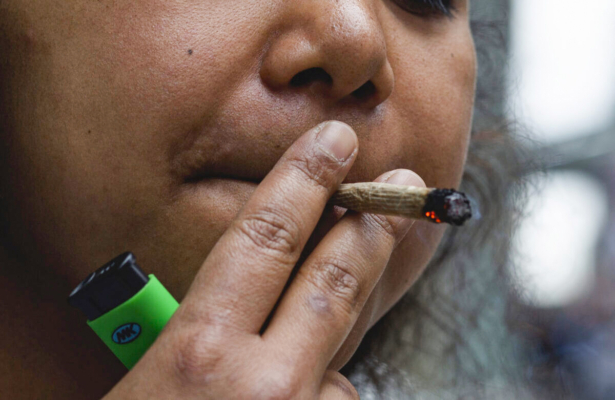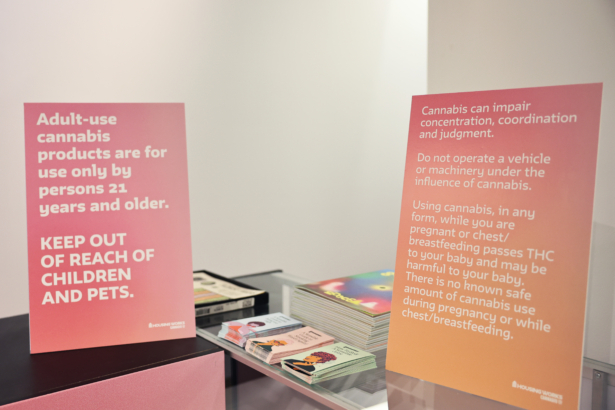Experts and public health advocates are voicing concerns about the rise in flavored cannabis products that appear to be marketed toward teenagers and young adults.
The concerns come as New York, which legalized recreational marijuana—also known as cannabis—in March 2021, has opened more legal outlets for the recreational use of the psychoactive drug in recent months.
Its first legal recreational marijuana dispensary opened in Manhattan in December. Dozens more dispensaries are expected to open in the coming months.
However, health experts fear that flavored cannabis products, like the ones being offered in the Manhattan dispensary—including flavors like “peach dream,” “mad mango,” and “cereal milk”—may be enticing teenagers and young adults to purchase them.
Previously, health advocates have taken aim at the tobacco industry for marketing harmful nicotine products, including e-cigarettes and vapes, to youths.
That has resulted in more cities and states, like New York, as well as California, Massachusetts, New Jersey, and Rhode Island, banning flavored tobacco products.
“We should learn from the nicotine space, and I certainly would advocate that we should place similar concern on cannabis products in terms of their appealability to youth,” said Katherine Keyes, a professor of epidemiology at Columbia University.

Marketing Toward Youth Is ‘Absurd’
“If you go through a cannabis dispensary right now, it’s almost absurd how youth-oriented a lot of the packaging and the products are,” she said.
Elsewhere, Linda Richter, the vice president of prevention research and analysis at Partnership to End Addiction, also called for the rules regarding harmful nicotine products to be extended to marijuana by the federal government.
“There is more scrutiny on the tobacco industry, and very, very little in terms of rules, regulations, scrutiny, limitations when it comes to the cannabis industry,” she said. “That’s a real issue where you don’t have the weight of the federal government in terms of standards of packaging and marketing.”
New York’s law (pdf) to legalize recreational marijuana in March 2021 explicitly forbids marketing and advertising of content that “is designed in any way to appeal to children or other minors,” that promotes “overconsumption,” or that appeals to “persons less than twenty-one years of age and/or populations at-risk of increased adverse health consequences.”
The law also establishes an Office of Cannabis Management (OCM) to regulate medical marijuana.
Under state law, a minor in possession of marijuana would face a $50 fine while licensed cannabis retailers that sell to them would face penalties, including the loss of their licenses. The penalties do not include prison time.
At the time the law was passed, Republican lawmakers who voted against the legislation warned it could have devastating consequences on youth in New York.
“Legalizing marijuana guarantees young people will have greater access to a drug they shouldn’t be anywhere near. The minute this becomes readily available, the safety risks in our communities and on our roadways will increase exponentially,” New York Assembly Republican Leader Will Barclay said in a statement at the time.

‘Consumers, Parents Need to Be Aware’
Despite this, the OCM has not yet rolled out rules on the labeling, packaging, and advertising of marijuana products that would ban them from displaying cartoons and neon colors or depicting things like cookies or cereal on packaging; labeling that could potentially entice young people.
“Consumers need to be aware—parents need to be aware—if they see products that look like other products that are commonly marketed to kids, that’s an illicit market product,” said Lyla Hunt, OCM’s deputy director of public health and campaigns.
Hunt added that she had recently seen a cannabis product labeled as “Stony Patch Kids” that she said looked similar to the popular candy “Sour Patch Kids.”
“We can regulate until we’re blue in the face. But the truth is, it’s a partnership between a compliant industry, strong regulations that are robust in their protections for youth, and then with parents, too,” Hunt added.
The Epoch Times has contacted New York’s Office of Cannabis Management for comment.
In October, the Republican Study Committee, a 156-member GOP House caucus, called on Congress to direct the Centers for Disease Control and Prevention to undertake further studies regarding the potential health impacts posed by the use of THC, the substance that’s primarily responsible for the psychoactive effects of marijuana, during childhood and early adolescence.
The committee asked that the study be focused on deaths by suicide and those involved in violent crime regarding the use of marijuana.
Medical use of cannabis is currently allowed in 37 states across the United States, while 21 states allow recreational use.
New York is set to open its second legal dispensary next week.
The Associated Press contributed to this report.
From The Epoch Times
